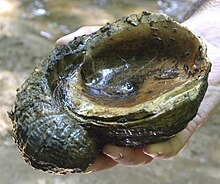Loading AI tools
Extinct genus of bivalves From Wikipedia, the free encyclopedia
Exogyra is an extinct genus of fossil marine oysters in the family Gryphaeidae, the foam oysters or honeycomb oysters.[1] These bivalves were cemented by the more cupped left valve. The right valve is flatter, and the beak is curved to one side. Exogyra lived on solid substrates in warm seas[citation needed] during the Jurassic and Cretaceous periods.[2]
| Exogyra Temporal range: | |
|---|---|
 | |
| Exogyra flabellata (Owl Creek Formation, Late Cretaceous, Mississippi) | |
| Scientific classification | |
| Domain: | Eukaryota |
| Kingdom: | Animalia |
| Phylum: | Mollusca |
| Class: | Bivalvia |
| Order: | Ostreida |
| Family: | Gryphaeidae |
| Genus: | †Exogyra Say, 1820 |
| Species | |
|
See text | |
The former subgenus Exogyra (Aetostreon) Bayle, 1878,[3] is sometimes considered a separate genus due to a lack of the fine set of parallel ribs (chomata) separated by pits on the inner surface of the valves (which is present in the nominate subgenus).[4]

Fossils of Exogyra have been found in:[2]
Afghanistan, Chile, China, Eritrea, Ethiopia, France, Germany, India, Kenya, Poland, Portugal, Somalia, Spain, Tanzania, the United Kingdom, and Yemen.
Afghanistan, Algeria, Argentina, Brazil, Bolivia, Canada (British Columbia), Bulgaria, Chile, Colombia (Hiló Formation, Tolima, Macanal and Chipaque Formations, Eastern Ranges),[13][14] Cuba, the Czech Republic, Egypt, Ethiopia, France, Germany, Greenland, Hungary, India, Iran, Israel, Italy, Jordan, Lebanon, Libya, Madagascar, Mexico, Morocco, Mozambique, New Zealand, Nigeria, Oman, Pakistan, Peru, Poland, Portugal, Serbia and Montenegro, Slovakia, South Africa, Spain, Sweden, Switzerland, Tanzania, Trinidad and Tobago, Tunisia, Turkey, USSR, Ukraine, the United Kingdom, United States (Alabama, Arizona, Arkansas, California, Colorado, Delaware, Georgia, Maryland, Minnesota, Mississippi, Missouri, Montana, New Jersey, New Mexico, North Carolina, Oklahoma, South Carolina, Tennessee, Texas, Utah, Wyoming), Venezuela, and Yemen.
Seamless Wikipedia browsing. On steroids.
Every time you click a link to Wikipedia, Wiktionary or Wikiquote in your browser's search results, it will show the modern Wikiwand interface.
Wikiwand extension is a five stars, simple, with minimum permission required to keep your browsing private, safe and transparent.